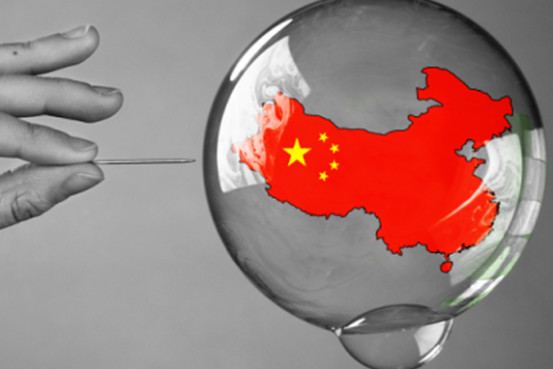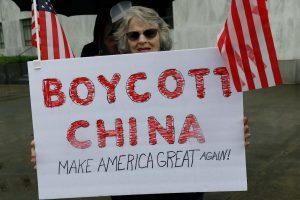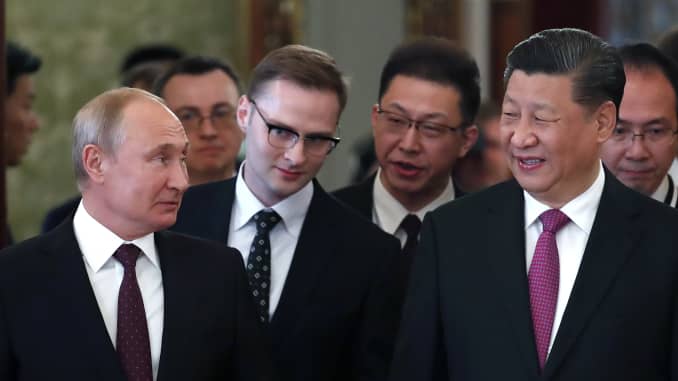By Stu Cvrk and Larry Schweikart
Part II of a Four Part Series
Part I HERE
The Long War
Which country is the greater long-term threat to U.S. interests? Communist China or Russia? In economic terms, the case is clear that Communist China will remain an existential threat to U.S. national security for the foreseeable future. Consider that China’s GDP is approaching that of the U.S., as noted here:
The Gross Domestic Product (GDP) in China was worth 14,200 billion US dollars in 2019, according to official data from the World Bank and projections from Trading Economics. The GDP value of China represents 11.72 percent of the world economy.
In comparison, the U.S. GDP was $21.2 trillion in 2019, while Russia’s GDP was $1.75 trillion in 2019. China’s economy is almost ten times that of Russia. Economically speaking, the Chicoms’ effort to subvert, spy on, and influence the US in terms of personnel resources alone dwarfs what the Russians can bring to bear on a daily basis. However, Trump also had begun eating into even that Chicom strength. Recently, China’s foreign exchanges have been running low. Exports, which had been growing at a 25% annual rate, shrank to a growth rate of only 2% in 2020. (“China’s Foreign Exchange Reserves are Running Out,” Epoch Times, November 11-17, 2020). China’s outstanding foreign exchange debt is $2 trillion, 60% of which is in one—to two-year short-term limits that must be paid in foreign currency. Now, about one-third of China’s foreign investments have flowed out of China and will continue to increase. Currently, China has about $1 trillion in U.S. debt (2/3 of its net foreign exchange reserves).
China’s external debt now slightly exceeds its foreign direct investment ($2T to $2.05 T); foreign holdings of Chinese bonds up 2.2 times 2015 (i.e., 737b). China’s current outflow is $2.2 trillion, although analysis in FXSTREET notes, “The size of China's actual foreign exchange reserves has been in a fog since it turned into a downward trend in 2015.” These fell again in October 2020 from $3.15 to $3.12.
 Indeed, Chinese debt may be closer to the verge of collapse than originally thought. The number of credit bonds that could not be repaid on their due dates (164) totaled some $24.4 billion. As occurred in the U.S. “housing bust” of 2007-2008, these included enterprises rated AAA by Chinese bond rating agencies---which of course, are under even more pressure to rate junk bonds highly than Moodys or Standard & Poor’s were during the American collapse. Among the Chinese firms falling behind, were the largest vehicle manufacturer in Liaoning Province, Brilliance Auto, and the state-run coal company, Henan Yongmei. Unlike the U.S., the Chinese credit rating companies often operate on the basis of direct bribes; in America, it was by giving the rating companies “business” in allowing them to rate the companies’ bonds.
Indeed, Chinese debt may be closer to the verge of collapse than originally thought. The number of credit bonds that could not be repaid on their due dates (164) totaled some $24.4 billion. As occurred in the U.S. “housing bust” of 2007-2008, these included enterprises rated AAA by Chinese bond rating agencies---which of course, are under even more pressure to rate junk bonds highly than Moodys or Standard & Poor’s were during the American collapse. Among the Chinese firms falling behind, were the largest vehicle manufacturer in Liaoning Province, Brilliance Auto, and the state-run coal company, Henan Yongmei. Unlike the U.S., the Chinese credit rating companies often operate on the basis of direct bribes; in America, it was by giving the rating companies “business” in allowing them to rate the companies’ bonds.
At present, China’s foreign exchange reserves are $3.12 trillion. Japan’s is $1 trillion, but it owns $5 trillion in foreign assets or perhaps doubles that of China. “If the current trend of moving basic production capacity outward continues,” FXSTREET observed, “and a trade deficit emerges, the current level of foreign exchange reserves may not be able to withstand such a "depletion." Yahoo News attempted to put a happy face on this, and noted that China’s foreign exchange reserves were “remarkably stable,” but then asked, “Is Beijing suppressing the strength of the yuan through intervention? And if so, why has the amount of foreign exchange reserves not grown as a result?”
Such issues underscored the threat President Trump posed to the Chinese Communist government in the area of economics and finance. Trump is the first U.S. president to push-back on pro-China policies that have decimated US industries. Economists now admit this danger is real and have labeled it the “China Shock,” which affects not only the USA but also western Europe. (Italo Colantone and Piero Stanig, “The Surge of Economic Nationalism in Western Europe,” Journal of Economic Perspectives, 33, Fall 2019, 128-151). Authors Italo Colantone and Piero Stanig note that “a stronger exposure to Chinese competition causes lower employment rates and lower wages at the level of local labor markets” and that this was a phenomenon particularly harmful “at the individual level [with low-wage workers].”
 In other words, Donald Trump was exactly right in foreseeing this threat. But what’s equally interesting---not just in the U.S. but in western Europe as well---is that the citizens see it and that they “respond to a decline in economic conditions of their community beyond any direct personal distress.” In other words, citizens aren’t stupid, and they don’t have to personally be affected to appreciate the dangers posed by the Chinese economic invasion.
In other words, Donald Trump was exactly right in foreseeing this threat. But what’s equally interesting---not just in the U.S. but in western Europe as well---is that the citizens see it and that they “respond to a decline in economic conditions of their community beyond any direct personal distress.” In other words, citizens aren’t stupid, and they don’t have to personally be affected to appreciate the dangers posed by the Chinese economic invasion.
The decimation of the U.S. economy at the hands of China corresponded to the U.S.-China trade deficit depicted in the below graphic. As more U.S. manufacturing moved to China, the U.S. trade deficit with China increased inexorably.
 The “China hands” [those Americans who followed Henry Kissinger’s lead in “opening China” and facilitating its rapid economic growth] would happily return to the pre-Trump status quo in a Biden administration, and be willing to accept a few renminbi to assist the Chicoms in achieving their goal of world economic domination. And those China hands may get their wish given that Tony Blinken is Biden’s pick for secretary of state, as reported here by former CIA operative Charles “Sam” Faddis:
The “China hands” [those Americans who followed Henry Kissinger’s lead in “opening China” and facilitating its rapid economic growth] would happily return to the pre-Trump status quo in a Biden administration, and be willing to accept a few renminbi to assist the Chicoms in achieving their goal of world economic domination. And those China hands may get their wish given that Tony Blinken is Biden’s pick for secretary of state, as reported here by former CIA operative Charles “Sam” Faddis:
Blinken has been acting as Managing Director of the Penn Biden Center for Diplomacy and Global Engagement that Joe Biden established in 2018 at the University of Pennsylvania.
If you understand Biden’s announcement to mean that it will be Blinken’s job to function as America’s top diplomat and represent our interests to the world, however, you completely misunderstand the situation. As Director of the Penn Biden Center, Blinken did not preside over some institute charged with educating Americans and helping them understand the world around us. He presided over an entity that was funded in large measure by the Chinese and which seems to have been dedicated primarily to pushing Chinese propaganda inside the United States.
Since its founding, the Penn Biden Center has received in excess of $70 million from Chinese donors. Until questioned about it, the Center reported none of those donations even though it was required to by law. In excess of $20 million is still categorized as having come from anonymous Chinese sources. One donation alone, received on May 29, 2018, was for $14.5 million.
Imagine Secretary of State Blinken in a tense meeting with his Chicom counterpart, Foreign Minister Wang Yi. Whose national security interests will Blinken represent? Will Yi call in the Chicoms’ chips? With friends such as the thoroughly compromised Tony Blinken, who needs enemies? During a Biden administration, the Chicoms are in line to receive a YUUUGE return on their investment in the China hands over the years.
In addition to the military and economic threat posed by Communist China, the Chinese have been conducting an intensive espionage campaign since the early 1960s. The Chicoms have literally flooded the U.S. with spies, as recently reported by The Gatestone Institute here. And as reported by the Washington Free Beacon here:
Beijing's spy networks in the United States include up to 25,000 Chinese intelligence officers and more than 15,000 recruited agents who have stepped up offensive spying activities since 2012, according to a Chinese dissident with close ties to Beijing's military and intelligence establishment. Chinese “defensive intelligence was mainly focused on learning about the United States. The operations then shifted in 2012 to “offensive” spying. Around 2012 [as Xi Jinping was elevated to Chairman of the Chinese Communist Party], a decision was made by Chinese leaders to dispatch another 5,000 spies to the United States.
China's intelligence targets included several strategic areas of the United States. The first [priority] is to obtain military weapons-related technology. Second, Chinese intelligence is engaged in "buying" senior U.S. officials personally, and a third objective is buying family members of American political or business elites with a view to getting intelligence and to make big business deals in China's favor. A fourth priority is penetrating the American internet system and critical infrastructure by implanting malicious software. They have successfully penetrated all the major defense weapons suppliers of the U.S. government.
Interestingly, one of those Chinese spies was Sen. Dianne Feinstein’s “driver” for 20 years. “Coincidentally,” Sen. Feinstein (D-CA) was the leading Democrat on the U.S. Senate Select Committee on Intelligence during much of that 20-year period.
 Despite all of the aforementioned, a corrupt special counsel team and virtually the entire U.S. legacy media was fixated for over two years on a measly $100,000 social media campaign during the 2016 campaign by a Russian-controlled internet company and the parallel actions of 6 (!) Russian GRU officers.
Despite all of the aforementioned, a corrupt special counsel team and virtually the entire U.S. legacy media was fixated for over two years on a measly $100,000 social media campaign during the 2016 campaign by a Russian-controlled internet company and the parallel actions of 6 (!) Russian GRU officers.
It is more than just coincidental that the Democrat-Deep State focus has been on Russia and not on China. Let us explore why that is so.
Why the Russia Hate?
It might seem odd that a political party that for the better part of two decades (the 1970s and 1980s) was a perpetual apologist for the USSR would suddenly despise its newest iteration, Russia, so much. Actually, this isn’t surprising at all.
Once the Soviet Union ceased to be “left” as a “functioning” example of communism; it was worth supporting and encouraging. But after 1991, when communism ceased to be the operative political/economic system in Russia, and when it became essentially a (questionably) capitalist nation, the left abandoned it. Instead, as seen in countless movie plots, the Russians now are the only acceptable villains (unless you can bring back Nazis somehow). Vladimir Putin is caricatured in numerous storylines.
This is particularly ironic given that Putin was a KGB official and likely still has fond memories of his old organization. But now Russia is not---publicly at least---communist and can no longer serve as the object of liberals’ affection. Now it has to be destroyed as a heretic. China, on the other hand, has risen to the lofty heights once held by the Soviets. China is now the great Marxist hope of the world. For the media, the Hollywood left, academia, and others in the liberal stable, China is untouchable as an enemy and threat. And they know it.
 As the leader of world communism with whom the American Left has a special affinity, the ideological reason for the Russia hate resides in Beijing. But there is another corrupting influence for the Left’s shift from Russia to China---bribery.
As the leader of world communism with whom the American Left has a special affinity, the ideological reason for the Russia hate resides in Beijing. But there is another corrupting influence for the Left’s shift from Russia to China---bribery.
Larry Schweikart is the co-author of the New York Times #1 bestseller, A Patriot’s History of the United States, author of Reagan: the American President, and is the founder of the history educational website, Wild World of History, that features full courses in US and World history with “Professor Larry” instructing. Web: http://wildworldofhistory.com Twitter: @LarrySchweikart
Stu Cvrk served 30 years in the US Navy in a variety of active and reserve capacities, with considerable operational experience in the Middle East and the Western Pacific. An oceanographer and systems analyst through education and experience, Stu is a graduate of the US Naval Academy, where he received a classical liberal education. This functions as the key foundation for his political commentary. He threads daily on Twitter on a wide range of political topics, such as the military, foreign policy, government, economics, and world affairs. Twitter: @STUinSD


